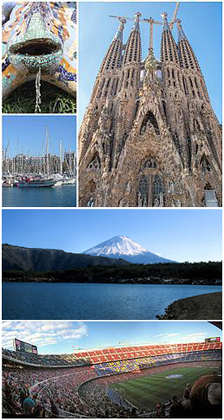Subtle Invasion
by Pere Calders
Clockwise from top left: Dragón del Parc Güell by Ardfern; Sagrada Familia by Bengt Nyman; Mount Fuji from Lake Sai by Frank Gualtieri; Camp Nou by Kieran Lynam; Barceloneta by Otto Normalverbraucher/Wikimedia Commons
At the Hostal Punta Marina, in Tossa de Mar, I met a disturbing Japanese man who didn’t bear the slightest resemblance to the idea I’d formed of the Japanese.
At suppertime he took a seat at my table after asking my permission without much ceremony. I was struck that he didn’t have slanted eyes or yellowish skin. Just the opposite: his cheeks were pink and his hair was fairly blond.
I was curious to see which dishes he ordered. It was childish, I admit, to expect foods that weren’t what we eat nowadays, or that made up exotic combinations. I was surprised that he had them bring him a typical Catalán meal: salad – “with extra onion,” he said in Catalán – then cap i pota (a stew of calf’s cheek and foot), followed by molls a la brasa i ametlles torrades (grilled mullet with roasted almonds). He finished off the meal with coffee, cognac, and a cigar.
I’d imagined the Japanese would eat with exaggerated neatness, even to the point of irritation, pincering the food as if each morsel were a mechanism in a timepiece. But this wasn’t the case: the man served himself with knife and fork, using them with great fluidity, and he chewed each mouthful without any breach of aesthetics. Reality shook my preconceptions.
He spoke Catalán as well as any of us, without the least trace of a foreign accent. This wasn’t so strange if you consider that the Japanese are very studious and quite clever. Yet it made me feel inferior, since I didn’t know a scrap of Japanese. I have to admit that I was the one, oddly enough, who introduced a foreign note into the conversation, adapting my every action – gestures, words, opening lines – to the concrete fact that my tablemate was Japanese. He, however, stayed fresh as a rose.
I thought he must have been a sales rep or dealer of digital cameras or computer chips – who also happened to know about cultured pearls. I tried all these topics, and he swept them away with a broad wave of his arm.
I swear that no detail, whether in his clothing or in his manner, gave away his Japanese origins. He even wore the shield of the Barcelona Football Club pinned to his lapel.”
“I sell saints’ images from Olot,” he said.
“There’s still a market for those things?” I asked. And he said that, yes, there was, that it had certainly fallen, but he was keeping it alive. He covered the southern region of the peninsula, and when there was a break or two holidays fell together, people were certain to be at home.
“There’s no place like home!” he decided with a look of satisfaction.
“Do you live in your country?”
“Where else would you want me to live?”
Yes, clearly, they’re globetrotters, and they get around everywhere. I looked at him again, and I swear that no detail, whether in his clothing or in his manner, gave away his Japanese origins. He even wore the shield of the Barcelona Football Club pinned to his lapel.
In a word, he was very suspicious, and I grew worried. My wife had her supper served in our room because she felt a bit sick. I described my chance meeting to her, decking the tale with my fears: when you came right down to it, the guy was a spy.
“Where did you get this idea that he’s Japanese?” she asked me.
I laughed, although without much glee, pitying her innocence.
“I recognise them a mile away,” I replied.
“You mean you’ve seen many Japanese people?”
“No, but I spot them immediately!”
“He told you he was Japanese?”
“Not once. They’re shrewd.”
“Did somebody else tell you?”
“No one told me anything. No one needs to tell me. I have the sharpest instincts!”
We had a falling-out. She is always getting at me, saying that I’m nasty and someday I’ll really put my foot in it. As if I didn’t have my wits about me! She seems to get pleasure from abandoning logic, and she is incredibly naïve.
That night I slept little and badly. I couldn’t get the Japanese man out of my head. Because as long as they show up as they are, with that little smile, those bows, that sideways glance, we’ll be able to protect ourselves. Or so I hope! But if they put on such a charade, such a bogus display, we’ll really have our hands full.
Translation copyright © 2013 by Lawrence Venuti, reproduced by kind permission of the translator and Asymptote. All rights reserved.
“Why translate Pere Calders?”
Read Lawrence Venuti’s essay about his translation at Asymptote.
Lawrence Venuti is a translation theorist and historian as well as a translator from Italian, French and Catalán. His translations include Antonia Pozzi’s Breath: Poems and Letters, the anthology Italy: A Traveler’s Literary Companion, Massimo Carlotto’s crime novel The Goodbye Kiss, I.U. Tarchetti’s Fantastic Tales and Ernest Farrés’s Edward Hopper: Poems, for which he won the Robert Fagles Translation Prize. His essays are collected in Translation Changes Everything: Theory and Practice (Routledge, 2012).
 Pere Calders (1912–1994) began his literary career in Barcelona in the 1930s, but wrote his definitive story collection Cròniques de la veritat oculta (Hidden Truth Chronicles, 1955) during his exile in Mexico after the Spanish Civil War. The novels L’ombra de l’atzavara (1964) and Ronda naval sota la boira (1966) confirmed his status as one of the great Catalán authors of the 20th century. Cròniques de la veritat oculta, published in a new edition by Grup 62, has been selected as a 2013 UK Panel Choice by New Spanish Books.
Pere Calders (1912–1994) began his literary career in Barcelona in the 1930s, but wrote his definitive story collection Cròniques de la veritat oculta (Hidden Truth Chronicles, 1955) during his exile in Mexico after the Spanish Civil War. The novels L’ombra de l’atzavara (1964) and Ronda naval sota la boira (1966) confirmed his status as one of the great Catalán authors of the 20th century. Cròniques de la veritat oculta, published in a new edition by Grup 62, has been selected as a 2013 UK Panel Choice by New Spanish Books.

